Japanese style ‘Seed bombs’ dropping to save environment, Aravalis
Introduced by a Japanese organic farmer and philosopher Masanobu Fukuoka last century, the seed bombs or the earth balls nendo dango (粘土団子) as are these known in Japan, consist of a variety of different seeds rolled within a ball of clay and compost.
Gurugram. As the monsoon comes knocking our doors with an imminent splash of downpours, a Gurugram-based woman environmentalist gears up to drop seed bombs in the eco-fragile Aravali hills here to effect aerial reforestation – the Japanese way.
Popularised by a Japanese organic farmer and philosopher Masanobu Fukuoka last century, the seed bombs or the earth balls nendo dango (粘土団子) as these are known in Japan, consist of a variety of different seeds rolled within a ball of clay and compost.
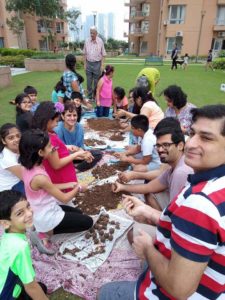 Alka Saran, an MPhil from the Panjab University, is an enthusiastic environmentalist introduced seed bombs concept in Gurgaon in 2017 after she visited Bangalore the same year. To begin with, she used about 1000 seed bombs to grow Neem trees. Now, she targets to aerial drop about one hundred thousand (100,000) seed bombs of various native species in Aravalis if she gets some organisation or individual supports here to bear the expenses of a chopper or small Cessna-type aircraft.
Alka Saran, an MPhil from the Panjab University, is an enthusiastic environmentalist introduced seed bombs concept in Gurgaon in 2017 after she visited Bangalore the same year. To begin with, she used about 1000 seed bombs to grow Neem trees. Now, she targets to aerial drop about one hundred thousand (100,000) seed bombs of various native species in Aravalis if she gets some organisation or individual supports here to bear the expenses of a chopper or small Cessna-type aircraft.
“In 2017, when I went to Bangalore in summers, I found Indian Institute of Science (IISc) experimenting with the seed bombs which were dropped in aerial distribution around lakes there. Then I thought of introducing the same concept in the Aravalis in Gurugram. On my return, I started looking for the native species to grow well in Aravalis. I made the seed bombs and started sharing the same with the hiking and trekking group Let’s Walk Gurgaon,” said Alka Saran adding that she started with 1000 Neem seed bombs as their germination rate was good, and later also added more species like Ronjh, Peelu, Gular, Peepal, and bistendu.
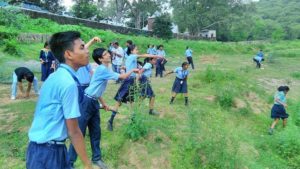 Thus started the journey of carrying seeds, seed pods, and seed bombs every Saturday morning and by 2018 a group of Eco-volunteers called ‘Let’s Plant Gurugram’ was formed with a vision to contribute to vanishing green cover in their own small way.
Thus started the journey of carrying seeds, seed pods, and seed bombs every Saturday morning and by 2018 a group of Eco-volunteers called ‘Let’s Plant Gurugram’ was formed with a vision to contribute to vanishing green cover in their own small way.
Alka also used Amaltas seed pods to dig and embed seed bombs in the soil. Then these Amaltas pods were left in the forest as food for the monkeys, jackals, hyenas, Nilgayis and other animals. These animals, in turn, disperse the seeds of Amaltas through their droppings. All this led Alka to form Let’s Plant Gurgaon group to promote the concept.
Alka also got in touch with Vijay Dhasmana who developed the Biodiversity Park on MG Road and he guided her on the native species. She also keeps consulting a noted environmentalist Sunil Harsana who is known for taking up cudgels for the revival of popular Mangar Bani forests in Aravalis.
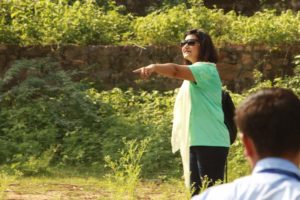 While talking about her next giant ambition of dropping one lac seed bombs on Aravali hills- the lungs of Gurugram and recharge zone, Alka said the target is one lac aerial seeds disbursal in July when it rains. It’s possible if we have the resources for making the seed bombs, which is a labour intensive work and take about 2-3 days to get the bombs solidity. There are over 200 water bodies in the Aravali hills and manual disbursal can take many days and during this course, we might also miss the valuable monsoon splash. Therefore, we require a chopper or a Cessna-type aircraft for a day or two for the quick dropping of seed bombs,” said Alka adding that bare seeds disbursal alone won’t work as there are bugs, insects, rodents, ants or birds that eat these seeds away.
While talking about her next giant ambition of dropping one lac seed bombs on Aravali hills- the lungs of Gurugram and recharge zone, Alka said the target is one lac aerial seeds disbursal in July when it rains. It’s possible if we have the resources for making the seed bombs, which is a labour intensive work and take about 2-3 days to get the bombs solidity. There are over 200 water bodies in the Aravali hills and manual disbursal can take many days and during this course, we might also miss the valuable monsoon splash. Therefore, we require a chopper or a Cessna-type aircraft for a day or two for the quick dropping of seed bombs,” said Alka adding that bare seeds disbursal alone won’t work as there are bugs, insects, rodents, ants or birds that eat these seeds away.
Each seed bomb costs around Rs. 5 that include the cost of seed and labour involved in it.
Alka also takes students to the Aravalis and makes them make seed bombs or sow the same there. There are about 45 trails in Aravali and she has taken the students of The Sri Ram School and Sherwood Convent School to some of the spots there.
Alka Saran, has also been an art curator and educationist. Having grown up in Shillong and other places in the Northeast of India made her acutely aware of the intrinsic beauty of nature. She settled in Gurgaon 25 years ago when it was a clean, green, growing city where encountering rabbits, Nilgayis, and jackals on the roads was commonplace.
When this simple town grew to become a smart city, she joined a walking/trekking group called ‘Let’s Walk Gurgaon’ and started exploring the outskirts of Gurgaon every Saturday morning. Here again, she witnessed vast devastation caused by rapid ‘development’ over the years. This, coupled with the loss of her aging mother due to severe lung infection worsened by air pollution, led to her research and discovery of seed bombs.
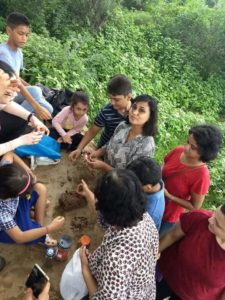 Alka’s earlier initiatives included conducting workshops on seed bombs in schools and taking students to disperse them near water bodies in the Aravalis, seed bomb making session at Raahgiri, making seed embedded Tricolour wrist bands for the Independence Day, workshop on seed bombs at Butterfly Park, CSR activity on seed bombs at Stryker India corporate office, making seed embedded papier mache Laxmi-Ganeshas for Diwali Melas in condominiums, making seed embedded papier mache Snowmen and Christmas decorations, and also papier mache balloons for Holi and Easter seed bombs.
Alka’s earlier initiatives included conducting workshops on seed bombs in schools and taking students to disperse them near water bodies in the Aravalis, seed bomb making session at Raahgiri, making seed embedded Tricolour wrist bands for the Independence Day, workshop on seed bombs at Butterfly Park, CSR activity on seed bombs at Stryker India corporate office, making seed embedded papier mache Laxmi-Ganeshas for Diwali Melas in condominiums, making seed embedded papier mache Snowmen and Christmas decorations, and also papier mache balloons for Holi and Easter seed bombs.
She plans to work in a systematic manner for the Environment through her newly formed Earth Supporters Trust and engage with as many schools as possible and form an Eco-Club. She also wants to work towards bringing about a ban on plastic National flags in Gurugram by August 15, to mobilize Gurugrammers to adopt eco-friendly seed embedded gift items and idols and to motivate citizens to minimize consumption behavior and inculcate the concept of Refuse, Reduce, Reuse, Repair and Recycle.


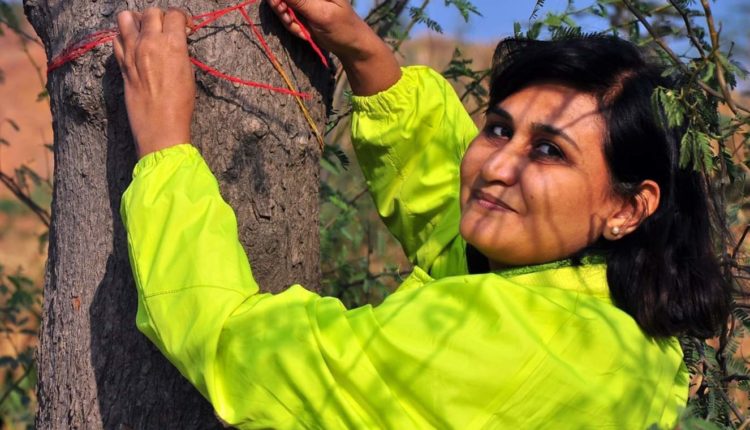
[…] Japanese style ‘Seed bombs’ dropping to save environment, Aravalis (asiancommunitynews.c… […]